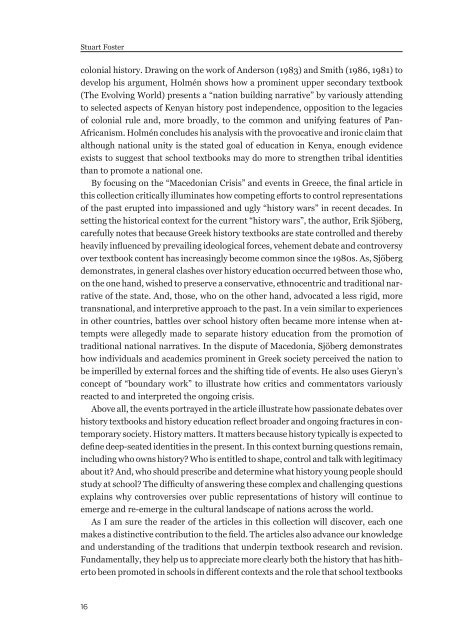Dominant Traditions in International Textbook Research and Revision
Dominant Traditions in International Textbook Research and Revision
Dominant Traditions in International Textbook Research and Revision
You also want an ePaper? Increase the reach of your titles
YUMPU automatically turns print PDFs into web optimized ePapers that Google loves.
Stuart Foster<br />
colonial history. Draw<strong>in</strong>g on the work of Anderson (1983) <strong>and</strong> Smith (1986, 1981) to<br />
develop his argument, Holmén shows how a prom<strong>in</strong>ent upper secondary textbook<br />
(The Evolv<strong>in</strong>g World) presents a “nation build<strong>in</strong>g narrative” by variously attend<strong>in</strong>g<br />
to selected aspects of Kenyan history post <strong>in</strong>dependence, opposition to the legacies<br />
of colonial rule <strong>and</strong>, more broadly, to the common <strong>and</strong> unify<strong>in</strong>g features of Pan-<br />
Africanism. Holmén concludes his analysis with the provocative <strong>and</strong> ironic claim that<br />
although national unity is the stated goal of education <strong>in</strong> Kenya, enough evidence<br />
exists to suggest that school textbooks may do more to strengthen tribal identities<br />
than to promote a national one.<br />
By focus<strong>in</strong>g on the “Macedonian Crisis” <strong>and</strong> events <strong>in</strong> Greece, the f<strong>in</strong>al article <strong>in</strong><br />
this collection critically illum<strong>in</strong>ates how compet<strong>in</strong>g efforts to control representations<br />
of the past erupted <strong>in</strong>to impassioned <strong>and</strong> ugly “history wars” <strong>in</strong> recent decades. In<br />
sett<strong>in</strong>g the historical context for the current “history wars”, the author, Erik Sjöberg,<br />
carefully notes that because Greek history textbooks are state controlled <strong>and</strong> thereby<br />
heavily <strong>in</strong>fluenced by prevail<strong>in</strong>g ideological forces, vehement debate <strong>and</strong> controversy<br />
over textbook content has <strong>in</strong>creas<strong>in</strong>gly become common s<strong>in</strong>ce the 1980s. As, Sjöberg<br />
demonstrates, <strong>in</strong> general clashes over history education occurred between those who,<br />
on the one h<strong>and</strong>, wished to preserve a conservative, ethnocentric <strong>and</strong> traditional narrative<br />
of the state. And, those, who on the other h<strong>and</strong>, advocated a less rigid, more<br />
transnational, <strong>and</strong> <strong>in</strong>terpretive approach to the past. In a ve<strong>in</strong> similar to experiences<br />
<strong>in</strong> other countries, battles over school history often became more <strong>in</strong>tense when attempts<br />
were allegedly made to separate history education from the promotion of<br />
traditional national narratives. In the dispute of Macedonia, Sjöberg demonstrates<br />
how <strong>in</strong>dividuals <strong>and</strong> academics prom<strong>in</strong>ent <strong>in</strong> Greek society perceived the nation to<br />
be imperilled by external forces <strong>and</strong> the shift<strong>in</strong>g tide of events. He also uses Gieryn’s<br />
concept of “boundary work” to illustrate how critics <strong>and</strong> commentators variously<br />
reacted to <strong>and</strong> <strong>in</strong>terpreted the ongo<strong>in</strong>g crisis.<br />
Above all, the events portrayed <strong>in</strong> the article illustrate how passionate debates over<br />
history textbooks <strong>and</strong> history education reflect broader <strong>and</strong> ongo<strong>in</strong>g fractures <strong>in</strong> contemporary<br />
society. History matters. It matters because history typically is expected to<br />
def<strong>in</strong>e deep-seated identities <strong>in</strong> the present. In this context burn<strong>in</strong>g questions rema<strong>in</strong>,<br />
<strong>in</strong>clud<strong>in</strong>g who owns history? Who is entitled to shape, control <strong>and</strong> talk with legitimacy<br />
about it? And, who should prescribe <strong>and</strong> determ<strong>in</strong>e what history young people should<br />
study at school? The difficulty of answer<strong>in</strong>g these complex <strong>and</strong> challeng<strong>in</strong>g questions<br />
expla<strong>in</strong>s why controversies over public representations of history will cont<strong>in</strong>ue to<br />
emerge <strong>and</strong> re-emerge <strong>in</strong> the cultural l<strong>and</strong>scape of nations across the world.<br />
As I am sure the reader of the articles <strong>in</strong> this collection will discover, each one<br />
makes a dist<strong>in</strong>ctive contribution to the field. The articles also advance our knowledge<br />
<strong>and</strong> underst<strong>and</strong><strong>in</strong>g of the traditions that underp<strong>in</strong> textbook research <strong>and</strong> revision.<br />
Fundamentally, they help us to appreciate more clearly both the history that has hitherto<br />
been promoted <strong>in</strong> schools <strong>in</strong> different contexts <strong>and</strong> the role that school textbooks<br />
16

















